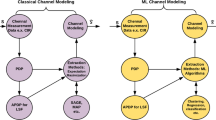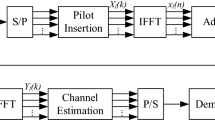Abstract
Channel impulse response of a multiple input multiple output-orthogonal frequency division multiplexing (MIMO-OFDM) channel contains a smaller number of nonzero components. In addition, locations of nonzero taps coincide in delay domain. So channel impulse responses can be modeled into an approximately group sparse signals. In this work we use extended sparse Bayesian learning (ESBL), a new method for multichannel compressive sensing for channel estimation in MIMO-OFDM. In joint extended sparse Bayesian learning (JESBL), both pilot and data subcarriers are utilized for channel estimation. These methods can reduce the number of pilot subcarriers in OFDM and improve the spectral efficiency of the MIMO-OFDM system.
Similar content being viewed by others
References
Daniel Eiwen, Georg Taubock, Franz Hlawatsch, Holger Rauhut, Nicolai Czink, “Multichannel-compressive estimation of doubly selective channels in MIMO-OFDM systems: Exploiting and enhancing joint sparsity,” Proc. of IEEE Int. Conf. on Acoustics Speech and Signal Processing, ICASSP, 14–19 Mar. 2011 (IEEE, 2011), DOI: 10.1109/ICASSP.2010.5496098.
Ranjitha Prasad, Chandra R. Murthy, Bhaskar D. Rao, “Joint approximately sparse channel estimation and data detection in OFDM systems using sparse Bayesian learning,” IEEE Trans. Signal Process. 62, No. 14, 3591 (Jul. 2014), DOI: 10.1109/TSP.2014.2329272.
Ranjitha Prasad, Chandra R. Murthy, “Bayesian learning for joint sparse OFDM channel estimation and data detection,” Proc. of IEEE Conf. on Global Telecommunications, GLOBECOM, 6–10 Dec. 2010, Miami, FL, USA (IEEE, 2010), pp. 1–6, DOI: 10.1109/glocom.2010.5683775.
Sinem Coleri, Mustafa Ergen, Anuj Puri, Ahmad Bahai, “Channel estimation techniques based on pilot arrangement in OFDM systems,” IEEE Trans. Broadcasting 48, No. 3, 223 (Sept. 2002), DOI: 10.1109/TBC. 2002.804034.
Yann Barbotin, Ali Hormati, Sundeep Rangan, Martin Vetterli, “Estimating sparse MIMO channels having common support,” Proc. of IEEE Int. Conf. on Acoustics, Speech and Signal Processing, ICASSP, 22–27 May 2011 (IEEE, 2011), DOI: 10.1109/icassp.2011. 5946268.
Zhilin Zhang, Bhaskar D. Rao, “Sparse signal recovery with temporally correlated source vectors using sparse Bayesian learning,” IEEE J. Selected Topics Signal Processing 5, No. 5, 912 (Sept. 2011), DOI: 10.1109/JSTSP. 2011.2159773.
Author information
Authors and Affiliations
Corresponding author
Additional information
Original Russian Text © K.C. Jomon, S. Prasanth, 2017, published in Izvestiya Vysshikh Uchebnykh Zavedenii, Radioelektronika, 2017, Vol. 60, No. 2, pp. 97–106.
ORCID: 0000-0002-1294-2420
About this article
Cite this article
Jomon, K.C., Prasanth, S. Joint channel estimation and data detection in MIMO-OFDM using distributed compressive sensing. Radioelectron.Commun.Syst. 60, 80–87 (2017). https://doi.org/10.3103/S0735272717020029
Revised:
Published:
Issue Date:
DOI: https://doi.org/10.3103/S0735272717020029




